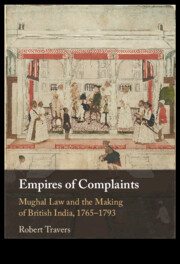
- Cited by 3
-
Cited byCrossref Citations
This Book has been cited by the following publications. This list is generated based on data provided by Crossref.
Abbott, Nicholas J. 2023. ‘It all comes from me’: Bahu Begam and the making of the Awadhnawabi, circa1765–1815. Modern Asian Studies, Vol. 57, Issue. 2, p. 458.
Kia, Mana 2024. Lingering with Adab before Rushing to Literature. History of Humanities, Vol. 9, Issue. 1, p. 65.
Siddiqui, Osama 2024. Re-Thinking the ‘Social’ in British Colonial and South Asian History. The Historical Journal, p. 1.
- Publisher:
- Cambridge University Press
- Online publication date:
- September 2022
- Print publication year:
- 2022
- Online ISBN:
- 9781009127882
- Subjects:
- Legal History, Area Studies, South Asian History, Law, Asian Studies, History


